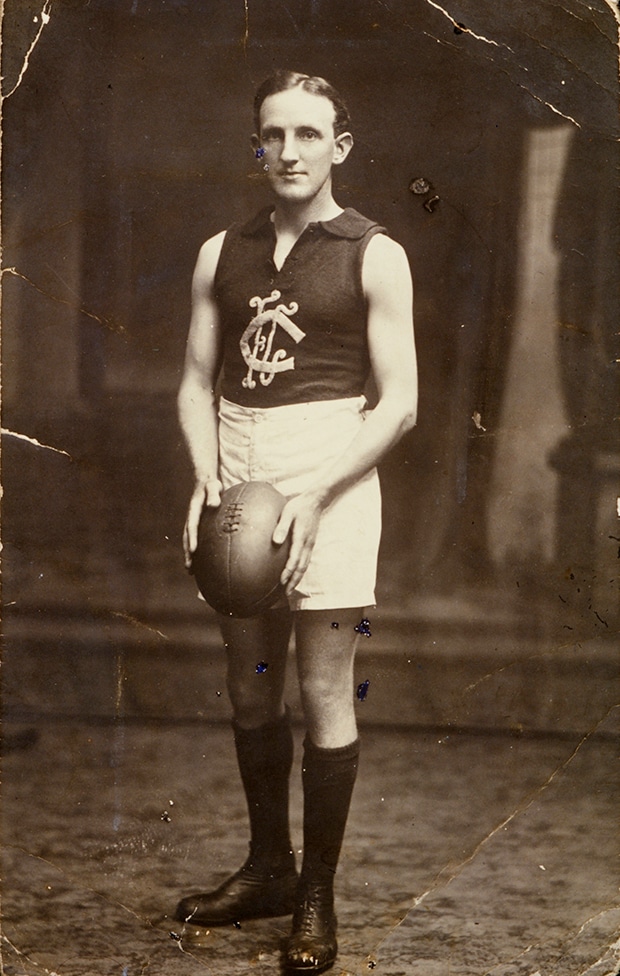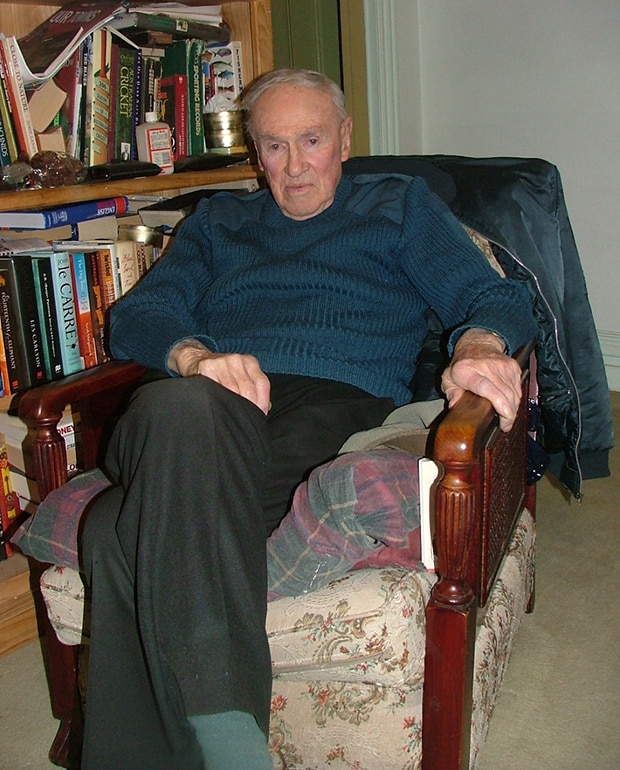Mac Wilson – until Wednesday Carlton’s (and the AFL’s) oldest surviving former player – has died at the age of 103 years, one month and one day.
Prior to Wilson, only Newton Septimus Weston Chandler – 'the grand old man of Princes Park' as he is remembered – reached the three figures. Chandler, the 69-game footballer, recruiter, secretary, vice-president and treasurer, was in fact 103 years, six months and six days when he finally met his maker on March 24, 1997.

Newton Chandler, the 69-game Carlton footballer, recruiter, secretary, vice-president and treasurer, was 103 years, six months and six days when he died. Chandler is pictured here circa 1919. (Photo: Supplied)
In July 2014, Wilson became Carlton’s second member of the 'Ton Up Club'. On that occasion, he received a card signed by members of the current playing group, amongst them Dennis Armfield who wears Wilson’s old No.27 on his back.
With the passing of Chandler and now Wilson, Carlton’s only surviving Ton Up Club member is Keith Rae, the 15-game former centreman of 1939 and ’43 who turned 100 on July 30 this year.
Andrew McDonald 'Mac' Wilson was born in the Yarra Valley town of Woori Yallock on July 9, 1914, 19 days before the official outbreak of the First World War. Not long after, his family relocated to the Nyah region on the other side of Swan Hill in the Mallee, only to return to Woori in 1934.
Having played at Piangil where the ’45 Carlton premiership player Jim Mooring also chased the leather, Wilson later returned to Woori Yallock for a season (and represented the Woori team in its first Grand Final victory in ’47), before joining Sunshine with the promise of a job. Sunshine, in the Footscray sub-district League, must have doubled as football’s school of hard knocks for Mac, although one of his contemporaries there at the time was none other than the fearsome Bob Chitty, later the Carlton captain, premiership player, dual best and fairest and lord protector.
“He (Chitty) was a hard, tough fellow and he trained just as hard as what he played you know,” Wilson said in an interview with this reporter in 2009. “If you happened to knock him over at training you were likely to get into a fight with Chitty.”
Wilson, like Chitty, ultimately crossed to Carlton – in the former’s case on the recommendation of Mooring, as Wilson explained.
“During the war the Air Force used to play games at Carlton, and my brother was in the Air Force. Anyway, he and I were walking around the ground looking at things and I was particularly good friends with Jimmy Mooring and Jimmy came from Piangil and he was a mate of mine,” Wilson said.
“Now he was walking around with Harry Bell (the then Carlton secretary) and he (Mooring) said to Bell, ‘This is the chap I’ve been telling you about’. Bell asked me then, ‘Come out and have a go’ and I said ‘Yeah, righto’ – but I wasn’t much interested in it . . . I liked playing football but I wasn’t much interested in playing League football. I was too shy I was.”

Mac Wilson relaxes at his Thornbury home, August 2009. (Photo: Supplied)
Wilson’s nine-game career would encompass the 1933 and ’44 seasons, at a time when the Allies gained momentum in World War II.
A late starter, (Wilson was 29 years, 21 days when he completed his senior League debut), he joined Carlton from Footscray District League club Sunshine at a time when young men continued to volunteer for military service and footballers were something of a rare commodity.
Seven of Wilson’s nine matches for Carlton would be as 19th man. Remarkably, his first and last games would result in 100+-point thrashings of Collingwood and Geelong, and his first full game would be a final.
According to the record books, Wilson followed his captain Jim Francis onto the field for the first time in Round 12, 1943, in what was the match with the black and whites at Victoria Park. Warming the pine as 19th man, Wilson must have sat there in awe as Francis (with eight goals) and Jack Wrout (seven) completed the rout, 28.10 (178) to the black and whites’ 11.8 (74).
It may well be that Mac didn’t get a run in this match, as he cites the Round 14 match versus Essendon at Windy Hill – Francis’ last game - as his first real League foray. As he said: “Arthur Sanger broke his arm and I was 19th man . . . and the first bloke I played on was ‘Dicky’ Reynolds”.
Wilson took his place in the dugout in three of his team’s last four games of the ’43 season, ending with Fitzroy at Brunswick Street Oval. The visitors’ 15-point win in that one earned them another shot at the Maroons in the first semi final, and Wilson got the call-up fir his first full game at half-back, replacing the injured Frank Anderson.
Regrettably, Fitzroy emerged 51-point victors and duly ended Carlton’s September campaign.
In February of the following year, Wilson enlisted in the RAAF, where basic training deprived him of any football for months. Not until Round 8 did Wilson make himself available and he got the call-up for another encounter with Collingwood, this time at Princes Park.
This time, Carlton won.
Wilson sat on the bench twice more, before taking his place in the starting line-up for the Round 17 match against Geelong at Princes Park. Another serving member of the RAAF turned out for the first time in that one - the West Australian-born future Carlton premiership captain and club champion Ern Henfry - who was near-best on the ground in the Blues’ 106-point demolition of the Pivotonians.
Wilson was either unavailable or omitted for what proved to be a controversial last game of the home and away season against Footscray the following weekend, when a hotly-disputed goal after the final bell gave the Bulldogs victory by one point and forced Carlton out of finals contention.
By then it was all over for Mac the player - but Mac the citizen would live on for almost three quarters of a century.
Wilson, whose wife ‘Billie’ predeceased him in 2001, died after a short illness. He is survived by his son Neil and daughter Anne.
His funeral is to be held next Wednesday, August 16, at Ern Jensen’s Funerals, 6 Bruce Street, Preston, commencing 2pm.



